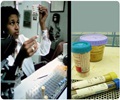Highlights:
- Feces transplantation effective than antibiotics in treating Clostridium difficile infection (CDI)
- Feces transplantations, currently performed as part of research projects may become commercialized
- New study recommends that Danish Tissue Banks should regulate feces transplantation in Denmark
Read More..
The Study Design
The study led by Christian Lodberg Hvas, a Consultant and a Clinical Associate Professor at the Department of Clinical Medicine at Aarhus University, has been funded by Danish Regions. The research team has compared the effect of feces transplantation against two antibiotics that are currently being used to treat Clostridium difficile.120 patients who were referred to Aarhus University Hospital with a Clostridium difficile infection were included in the study. Of this, 64 patients were approved for the randomized controlled trial. Among the 64, 24 were given feces transplantation, another 24 were given the antibiotic fidaxomicin and the remaining 16 were given a very reliable antibiotic, vancomycin.
Study Results
22 patients among the 24 who underwent feces transplantation were cured after just single transplantation. On the other hand, only 10 patients of the 24 who took fidaxomicin were cured and just 3 out the 16 study participants who took vancomycin were cured.Moreover, there was a recurrence of Clostridium infection in more than half of the participants in the trial from the group who were given antibiotics after they had completed a course of taking them. Therefore these patients were given a 'rescue' feces transplantation and ninety percent of them were cured by this.
Out of the 120 patients who were referred, 56 did not participate in the randomized trial, because they were too ill or they could not cope with participating. Subsequently, 49 patients received fecal transplantations as no other treatment options were available and 39 of them were brought back to life.
Observations of the Study Team
Christian Lodberg Hvas makes an observation, “If the Clostridium difficile infection isn't remedied in the most poorly patients, they will die from it. So we're often having a conversation about life or death when we make an agreement with the patient about the treatment. The effect of a feces transplantation is very dramatic, as after only a few days it makes it possible for very poorly patients to get up from their sick bed so they can be sent home to lead a normal life again - though we naturally still keep a close eye on them.”Dr. Hvas and team also concluded that the study that challenges the assumption that patients with a Clostridium infection may not be suitable to benefit from donor feces. Dr. Hvas remarks, “We now know this is wrong. Our study shows that the more poorly the patient is, the stronger the arguments for a feces transplantation actually are.”
The team of researchers recommends that fecal transplantation should be the first treatment chosen in Denmark's hospitals, in the future, as 9 out of every 10 patients are cured by transplantation. Additionally, patients who are assessed ‘too ill’ to receive a feces transplantation, should also consider having one.
Fecal Transplants in Denmark
In several Danish hospitals, fecal transplants are currently performed as part of research projects. In the autumn of 2018, Dr. Hvas and team received a grant of DKK 17 million from the Innovation Fund Denmark. This grant has been set aside for the task of turning feces taken from healthy, registered and tested donors into standard treatment. However, a treatment having the potential to cure 9 out of 10 patients will obviously interest companies that look to make a profit, and could threaten the status of feces bank which is now a public project. This is one of the many challenges in the way of adopting a fecal transplant as a standard treatment.Similar to the scenario in Belgium and Netherlands, Dr. Hvas and his colleagues are now following the regulations for safety and donations laid down in the Danish Tissue Act, as there is no Danish legislation on feces transplantation available yet. Building up and operation of feces banks may likely continue in the future if authorities in Denmark decide that feces donations should also be regulated in accordance with the Danish Tissue Act. On the contrary, the stool banks may be shut down if authorities decide that the treatment should be considered as a form of medication and hence must follow completely different legislation.
Dr. Hvas explains, “To put it simply: As a hospital, we cannot produce medication, so if feces transplantation is determined to be a form of medication, we cannot continue. This will mean that the treatment will be taken over by pharmaceutical companies, a process that's underway in the USA and elsewhere, because it's an area with large commercial interests at stake.”
Dr. Havs has found it personally challenging to visualize how 50 grams of unprocessed feces, blended with sterile saline and frozen to a temperature of minus 80 degrees before being thoroughly tested and administered at a university hospital, could be categorized as a form of medication. He and his colleagues are hoping that the Danish Patient Safety Authority which regulates the Danish tissue banks would also take the responsibility to regulate feces transplantation.
In conclusion, Dr. Hvas mentioned, “For us, it's also a question of ensuring that research continues to be free. As a university or university hospital, we don't have to make money from patents and commercialization - what we must do is ensure effective treatment in hospitals, and we can only offer this if the authorities permit it. So we're really anxious to hear what decision the authorities make.”
References:
- Fecal Microbiota Transplantation is Superior to Fidaxomicin for Treatment of Recurrent Clostridium difficile Infection - (https://www.gastrojournal.org/article/S0016-5085(18)35434-9/pdf)
Source-Medindia











